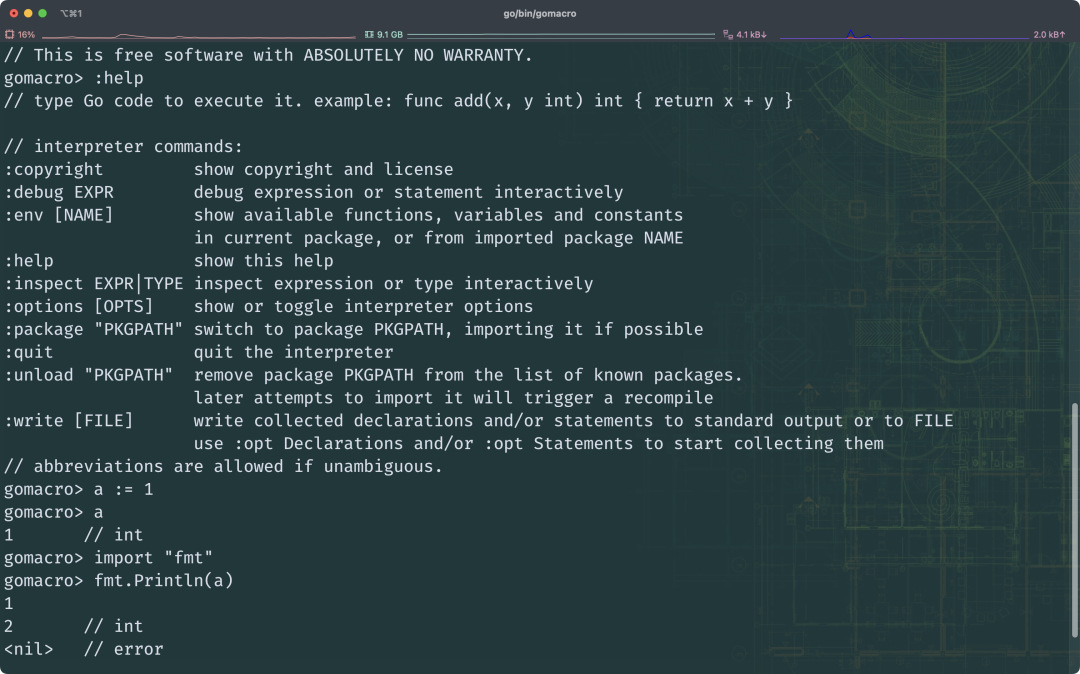gomacro is a near-complete Go interpreter, implemented in pure Go, that provides both interactive REPL and scripting modes and does not require the Go toolchain at runtime (except for some very specific scenarios: importing third-party packages at runtime). It has two dependencies outside the Go standard library: github.com/peterh/liner and golang.org/x/tools/go/packages.

REPL is an acronym for Read-Eval-Print Loop, a simple, interactive programming environment where REPL means, respectively.
- Read: gets user input
- Eval: Evaluate the input
- Print: prints and outputs the result of the evaluation
- Loop: loop that repeats Read-Eval-Print over and over again
REPL is very useful for learning a new programming language, and you can quickly verify your understanding through the output in this interactive environment. For example, Python, which we use most often, comes with a programming environment like this.
Features
Gomacro is one such REPL tool for the Go language, which can be used as.
-
A standalone executable with interactive
Go REPL, line editing and code completion: just rungomacrofrom the command line and type Go code. -
Just press the TAB key to be automatically prompted, and press the TAB key again to cycle through the possible contents. Line editing mainly follows Emacs.
Ctrl+AorHomejumps to the beginning of the line,Ctrl+EorEndjumps to the end of the line,Ald+Ddeletes the word starting from the cursor …… -
A Go generalization tool for experimentation
-
A Go source code debug tool
-
An interactive tool, if you use compiled Go with scientific libraries (physics, bioinformatics, statistics ……) ), you can import the same libraries from
gomacro REPL(immediately on Linux and Mac OS X, restart required on other platforms), call them interactively, check the results, feed them to other functions/libraries, all in one session. Imported libraries will be compiled, not interpreted, so they will be just as fast as compiled Go. -
Add
Eval()and script functions to your Go programs with just a few lines of code.1 2 3 4 5 6 7 8 9 10 11 12 13 14 15package main import ( "fmt" "reflect" "github.com/cosmos72/gomacro/fast" ) func RunGomacro(toeval string) reflect.Value { interp := fast.New() vals, _ := interp.Eval(toeval) // for simplicity, only use the first returned value return vals[0].ReflectValue() } func main() { fmt.Println(RunGomacro("1+1")) } -
One way to execute Go source code on-the-fly without a Go compiler: you can run
gomacro FILENAME.go. Or you can insert a line at the beginning of the Go source file#! /usr/bin/env gomacro, then mark the file as executable withchmod +x FILENAME.go, and finally use. /FILENAME.goto execute it (only on Unix-like systems: Linux, *BSD, Mac OS X …). -
Go code generation tools:
gomacrooriginally started as an experiment to add Lisp-like macros to Go, and they are very useful to simplify code generation. Macros are ordinary Go functions that are special in only one way: they are executed before the code is compiled, and their input and output is code.
Install
Requires Go version 1.13+, Gomacro is pure Go and in theory it should run on any platform supported by the Go compiler. The following combinations have been tested and are known to work.
- Linux: amd64,386, arm64, arm, mips, ppc64le
- Mac OS X: amd64,386 (386 binaries running on amd64 system)
- Windows: amd64,386
- FreeBSD: amd64,386
- Android: arm64, arm
The installation is done by executing the following command.
|
|
Usage
If you are running gomacro on Linux or Mac OS X, then import will work: it will automatically download, compile and import a package as follows.
|
|
Note: Internally, gomacro will compile and load a Go plugin containing all the export declarations listed in import ( ... ) with the export declarations of all the packages listed in import( ...).
The command go mod tidy, which is executed automatically before the plugin is compiled, will attempt to resolve any version conflicts due to direct import or indirect import of different versions of the same package (i.e. as required dependencies).
The Go plugin is currently only supported on Linux and Mac OS X.
Starting with version 2.6, gomacro also has an integrated debugger. There are three input methods.
- Press
CTRL+Cwhile explaining the code run - Type
: debug STATEMENT-OR-FUNCTION-CALLat the prompt - Add a statement (not enough expressions)
"break"or_ ="break"to the code and execute it normally
In all cases, execution will be paused and you will receive a debug> prompt that accepts the following commands: step, next, finish, continue, env [NAME], inspect EXPR, list, print EXPR-OR- STATEMENT .
The overall experience is a REPL that supports basic functionality, Tab auto-completion (e.g. typing fmt.Print and pressing Tab will switch between fmt.Print, fmt.Printf and fmt.Println), debugging and simple viewing of function signatures. gomacro is sufficient for basic quick verification of code run results.